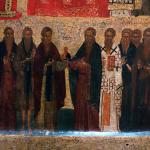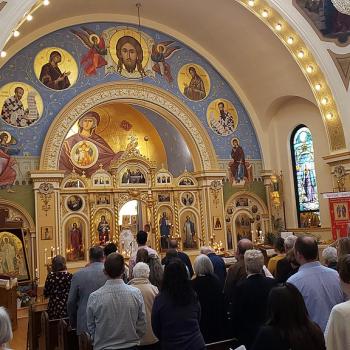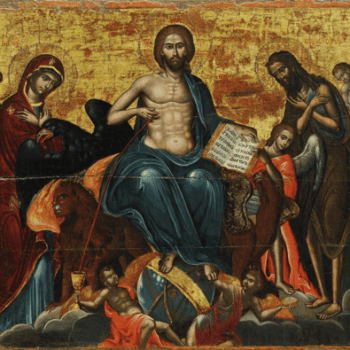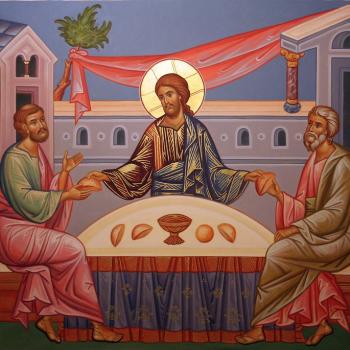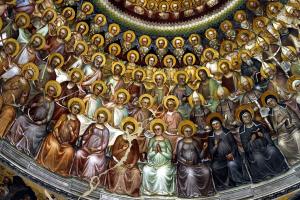
Christ does not give us the gift of himself in the eucharist so that by partaking of it, we reinforce our individualistic, selfish engagement of the world. He gives the eucharist so that through it, we can become better, that we open ourselves up beyond our individualistic barriers and embrace the world as true persons in Christ. To do this, we must overcome our selfishness, and the barriers we make between ourselves and everyone else. We must stop trying to become an individual set entirely apart from everyone and everything else. Instead, we should embrace others with love, and in doing so, find ourselves united with them, communing with them, so that we end up sharing with them all things, including their suffering:
For it makes [us] have communion in the sufferings of the mystical body, since, as the Apostle says [1 Cor 12.26], “If one member suffers anything, all the members suffer with it; or if one member glories, all the members rejoice with it.” Therefore, the suffering of one member flows through the communion to the others through mercy and pity; and from compassion of heart, words of consolation and material assistance of works of mercy and supports for infirmity flow in various ways from this communion into the members who are suffering: for by suffering together we are made like to the head of this body, because out of the compassion he had for us, he gave himself over to much suffering, that he might aid us by its effects. [1]
If we partake of the eucharist to reinforce our individualistic tendencies, we circumvent communion, and by circumventing communion, we risk receiving the eucharist in an unworthy manner. We are called to partake of the eucharist in a spirit of love, not self-assertion. The more we try to cut ourselves off from others, letting them suffer on their own, the more we reveal we reject communion, and by rejecting communion, we also cut ourselves off from Christ and the graces Jesus wants us to receive in and through the eucharist. To partake worthily, to receive in the spirit of communion, we are to accept the bonds of love which Christ wants us to form with others, and indeed, bonds which unite us not only with our fellow Christians, but with the whole of creation as well. Thus, we are to embrace the expectations of love, casting aside all that would get in the way of love:
Cultivate love for those who have gathered to listen. Give up jealousy that fears the superiority of others; the laziness of procrastination; the dispiritedness of being tired due to explaining something again and again; praising yourself and listing the faults of others; stinginess with regard to explaining the teaching; and concern for material things such as good and clothing. [2]
Thus, the more we love others, the more we will with them, the more we will find ourselves united with them in a communion which transcends all individualistic barriers. All of the sacraments are meant to give us graces, to make us better, helping us reestablish and develop the bonds of love which sin destroyed, as Vladimir Solovyov explained:
Thus the sacraments restore the harmony between the Godhead and the elemental things of creation, and in them is seen the true catholicity of the kingdom of God, its all-inclusiveness whose full consummation in the true-believing Church in days to come will enfold, as well as the New Heaven of the blessed, the New Earth, the renewed spiritual corporeality of the whole world. That is an image in outline of the Universal Church of Christ, both in principle and in the visible fact of her forms. [3]
Jesus, in the incarnation, becomes the personal mediator between God and creation, so that in and through him, the two become united. Baptism incorporates us into his body, making us christs in Christ, thereby allowing us to be united with God. As the eucharist is, likewise, Jesus offering himself to us, so when we partake of it worthily, open to the communion which God wants us to have with others, we will find ourselves being transformed and see how our unity itself is one with the body of Christ.
We should come to the eucharist with a prayerful attitude, one where we not only show our gratitude and love for God, but also, our love for others. We should see how in and through partaking of it, we open ourselves to others and share in Christ’s work to unite all creation in himself. “When a man joins himself to God in prayer he unites also the souls of others to him, becoming a link in the chain which binds God and material creation.” [4] And thus, the eucharist, though it is the real (not physical) presence of Christ, it brings graces to the whole of creation, be it spiritual or material. It embraces and uses material things to bring such graces to us, and, through us, to the rest of creation. We are, therefore, to have hope for the salvation of all things, that all things are called to share in and manifest the glory of God:
Christian doctrine holds a basic optimism toward God’s material creation that He always sees as “good” (Gn 1:18). It teaches in apocalyptic imagery that Christ will come at the end of time to transform this material universe by bring it to its completion in and through Himself. Just how this will be accomplished has not been revealed in detail. St. Paul writes, “We know that God was truly reconciling the world to himself in Christ” (1 Cor 5:19). Each individual member of Christ has a role to play on this earth and in the glorious life to come in the reconciliation of the cosmos to Christ’ power and rule. The Body of Christ will be filed up, not only with living human beings submitted to Christ’s reconciling power, but through their cooperation in relationship to the material world, the subhuman cosmos will lead in a mysterious way the created world back to the Father in Christ.[5]
Sadly, if we ignore this, if we try to use the eucharist to reinforce the division in the world, we partake of it selfishly, that is, sinfully. And if we do that, then, we risk partaking of communion, not for our salvation, but for our condemnation, as we reinforce the division established by sin and the hellish state or experience attached to sin.
[1] St. Albert the Great, On the Body of the Lord. Trans. Sr. Albert Marie Surmanski, OP (Washington, DC: CUA Press, 2017), 271.
[2] Tsong-kha-pa, The Great Treatise on the Stages of the Path to Enlightenment. Volume One. Trans. Lamrin Chenmo Translation Committee. Ed. Joshua W.C. Cutler and Guy Newland (Ithaca: NY: Snow Lion Publications, 2000), 64.
[3] Vladimir Solovyey, God, Man & The Church. The Spiritual Foundations Of Life. Trans. Donald Attwater (Cambridge: James Clarke & Co., 2016), 103
[4] Vladimir Solovyey, God, Man & The Church. The Spiritual Foundations Of Life, 33.
[5] George A. Maloney, SJ, Communion of Saints (Hauppauge, NY: Living Flame Press, 1988), 167.
Stay in touch! Like A Little Bit of Nothing on Facebook.
If you liked what you read, please consider sharing it with your friends and family!
N.B.: While I read comments to moderate them, I rarely respond to them. If I don’t respond to your comment directly, don’t assume I am unthankful for it. I appreciate it. But I want readers to feel free to ask questions, and hopefully, dialogue with each other. I have shared what I wanted to say, though some responses will get a brief reply by me, or, if I find it interesting and something I can engage fully, as the foundation for another post. I have had many posts inspired or improved upon thanks to my readers.



